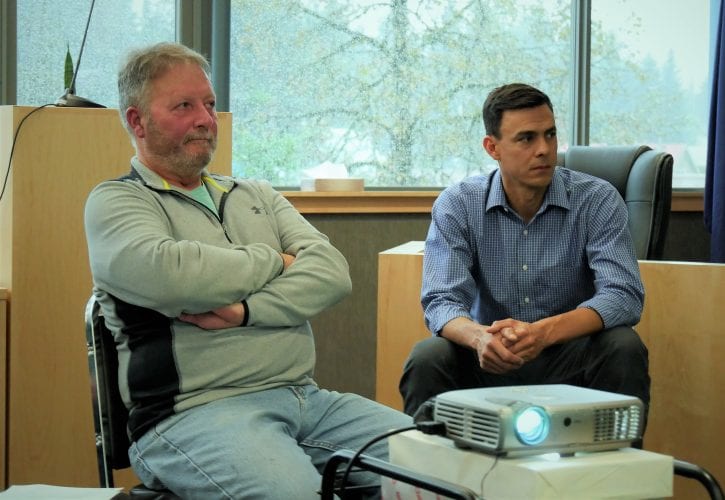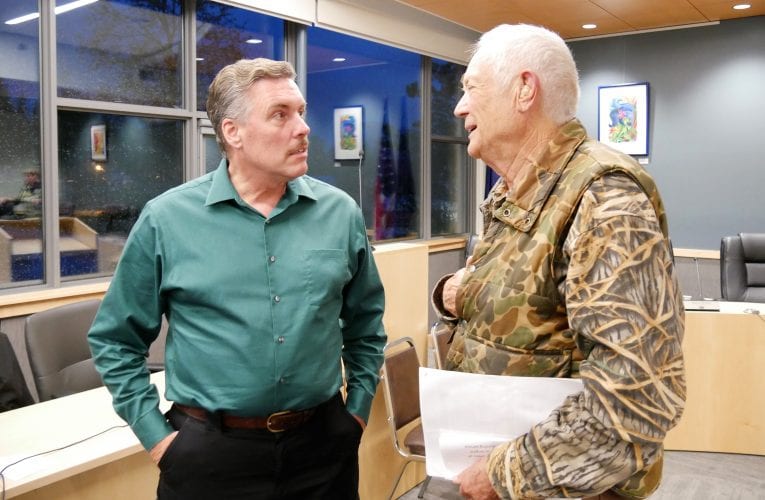
Petersburg resident Dennis Rogers (left) sits near Deputy Forest Supervisor Troy Heithdecker as they listen to a presentation by federal and state representatives on a possible “Alaska Roadless Rule”. Heithdecker also spoke in the presentation.(Photo by Angela Denning/KFSK)
Audio Player
The State of Alaska has had a problem with the Federal Roadless Rule since it was created 17 years ago. With some exceptions, the rule prohibits roads and timber sales on undeveloped parts of national forests. Over half of the Tongass National Forest in Southeast is protected by the rule or about nine and a half million acres. But the State wants the right to develop and has challenged the federal rule in court.
Now, the State is proposing an Alaska Roadless Rule and the USDA has started an Environmental Impact Statement to consider it. An Alaska specific rule could loosen up some areas for development or be more protective. U.S. Secretary of Agriculture, Sonny Perdue, says he’ll make a final decision by the summer of 2020.
At the Petersburg meeting, attendees learned about other states, like Idaho and Colorado, which have their own roadless rule with different land designations for different areas. But Southeast residents did not like being compared to other states.
78-year-old Jimmie Rosenbruch is a Gustavus resident. He travels by boat up and down the coast near Canada, Washington, and Oregon and says the forest has been ruined in other areas by development.
“When we talk about comparing Southeast Alaska to all the other Forest Service property, it’s not the same,” Rosenbruch said. “We have a pretty unique thing here and I don’t know that we’re considering that in what we’re doing here. Let’s decide what will really make this temperate rainforest be something for the next generation. And it’s not going to be by doing what we’ve been doing through all the rest of the system.”
Several in attendance said the issue was about the government wanting to develop timber. Dennis Rogers of Petersburg says a compromise on the current Roadless Rule would open up the door to large scale harvests, which he does not want.
“The Tongass is a gem,” Rogers said, “far different than forests in the rest of the Lower 48 and should be treated as such. You have its gaming reputation and a recognition as a special place. People come from around the world to see this forest.”
But the State’s Deputy Commissioner of the Department of Natural Resources, Heidi Hansen, says it’s not all about timber.
“I would hate for people to walk out of here thinking it’s just about clearing trees,” Hansen said. “That’s not what this conversation is about. It’s also about the potential for providing access to power and access to connectivity that maybe isn’t there right now.”
But many weren’t convinced like Don Hernandez of Point Baker on northern Prince of Wales Island.
“I think the state has a big credibility issue here because nobody really believes that the effort to do away with the roadless rule has to do with power lines and community access,” Hernandez said. “It’s pretty well understood that the driving force for the last 17 years is the State wants to be able to access more old growth timber.”

Forest Supervisor of the Tongass National Forest, Earl Stewart, speaks with Gustavus resident, Jimmie Rosenbruch, after the Q and A session in Petersburg, Sept. 25. (Photo by Angela Denning/KFSK)
One resident asked why they would want to build new roads when there is not enough money to maintain existing ones. Another resident called the state’s use of the term “community development” a buzz word for building roads.
No one spoke in favor of more development for any reason.
Representatives with the forest service said they wanted to receive comments and input but were not recording anything at the meeting, which frustrated some people like Mike Stainbrook of Petersburg.
“If it’s important to receive the ideas and dialogue and answer questions, why aren’t we recording this now and making this officially a part of the process?” Stainbrook said.
Troy Heithdecker, Deputy Forest Supervisor, says they usually don’t document oral comments but they do consider them.
“Anything that’s shared as far as input, comments, will be taken into consideration,” Heithdecker said. “I mean, we don’t come here and leave these meetings and say, ‘oh, that’s great, and move on,’ this is part of our process.”
But it won’t be official testimony unless it’s written down and submitted. The deadline for that is October 15. An electronic comment form can be found here.
The State is also forming an Alaska Roadless Rule Citizen Advisory Committee for the project. The group is supposed to forward recommendations to the state by November 30. But as of the Petersburg meeting, no one had been appointed to the committee. An on-line application can be found here.










